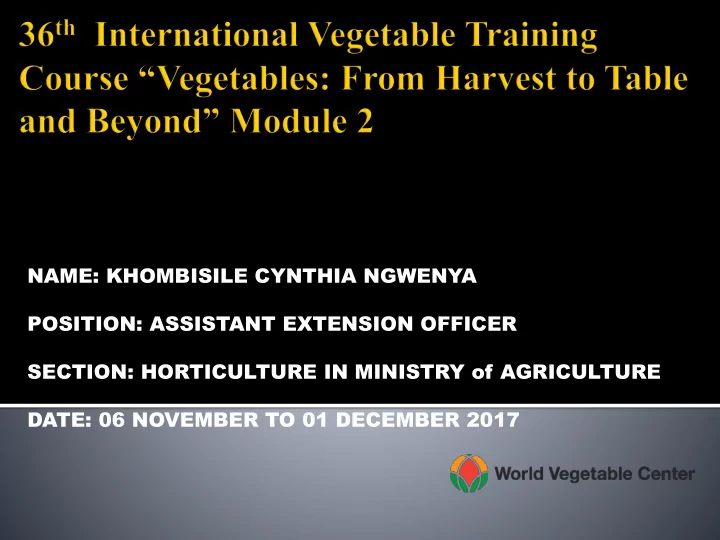

NAME: KHOMBISILE CYNTHIA NGWENYA POSITION: ASSISTANT EXTENSION OFFICER SECTION: HORTICULTURE IN MINISTRY of AGRICULTURE DATE: 06 NOVEMBER TO 01 DECEMBER 2017
The Kingdom of Swaziland is a landlocked country between Mozambique and South Africa. It has a population of 1.2 million people. Area 17,364 sq km (6,704 sq miles) Major languages Swazi, English (both official) Life expectancy 50 years (men), 49 years (women) Currency Lilangeni It is ruled by King Mswati III 2 of x
MAP OFAFRICA MAP OF SWAZILAND
QUEEN MOTHER KING OF SWAZILAND
EMAKHOSIKATI MAIDENS 5
6 of x
Three topics I found interesting in module 2 1. Quality and standard control. How to safeguard our health from eating 2. vegetables and fruits. 3. Food processing and nutritional quality of vegetables and fruits
8 of x
IMPROVING NUTRITIONAL STATUS THROUGH HOME GARDENING
10 of x
There are people living in the urban areas and in government houses and they don’t have land to grow their own food leading to them not to eat a balanced diet meal.
➢ There is a high rate of malnutrition. ➢ There is a high rate of obesity due to poor nutrition. ➢ There is high pollution of plastic and plastic containers. ➢ There is low consumption of fresh and safe vegetables.
❖ To improve the nutritional status of people in Swaziland. ❖ To encourage the eating of more fresh and safe vegetables to Swazis. ❖ To recycle plastic and other plastic containers using it for growing their vegetables thus decreasing pollution and reducing the effects of climate change.
14 of x
15 of x
16 of x
17 of x
There will be trainings to make them aware of how they can grow their own vegetables safely yet they don’t have land from April 2018 to March 2019 Demonstration of how to prepare their containers [making holes at the bottom], how to prepare their soils and irrigation and how to apply nutrients to the plants from May 2018 to April 2019 18 of x
Demonstration of how to plant their vegetables, how different hangings can be done and many more ways where they can place their vegetables from May 2018 to April 2019. Trainings on how to prepare their vegetables so they can not lose vitamins and minerals. Trainings on how they can preserve them if they have produced in excess from June 2018 to May 2019. 19 of x
▪ Ministry of agriculture which comprises of extension and home economics staff. ▪ Ministry of health which comprises of nutritionists. ▪ NGOs Farmers. 20 of x
21 of x
➢ There will be an increase in the consumption of fresh and safe vegetables. ➢ There will be improved nutrition leading to a decrease in malnutrition and obesity. ➢ After most people have adopted the technology, the growing of vegetables will increase such that they will sell to their neighbours thus increasing their income. ➢ Preservation of vegetables done properly.
Materials Cost Transport E20,000.00 x 8 Labour E30,000.00 x 8 Inputs E50,000.00 x 8 Containers Free TOTAL E100,000.00 X 8 = E800,000.00 NB: E16.00 = $1 USD 50,000.00 These are prediction for 1 area. 8 Areas targeted 23 of x
➢ Farmers might not attend meetings as people in the cities are always busy or at work. ➢ Farmers might start using pesticides on the vegetables. ➢ The women might start to neglect their personal and family care as they have to attend meetings. ➢ Might not get finances to do the project.
25 of x
26 of x
Recommend
More recommend